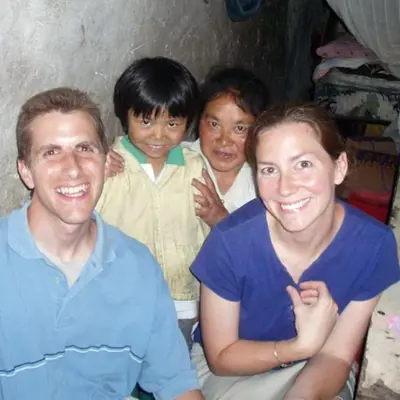
December 2, 2013
Dr. Trent Engbers, assistant professor of political science, and Lisa Chamberlin, instructor in the Intensive English Program, both stayed in the Guizhou Province, one of the poorest provinces in China, during their tours in the Peace Corps. Engbers went with his wife, Kimberly, from 2005 to 2007, just before Chamberlin, who served from 2008 to 2010. Both Engbers and Chamberlin taught college-level English, but each experienced their own unique challenges and brought back their own individual lessons.
Lisa Chamberlin: Overcoming culture shock
Chamberlin stayed in an apartment in the mountains with a site-mate and found that when she was overwhelmed by culture shock, she could turn to the renewing comfort of nature. "I could look out the window and see the mountains. There was so much beauty around me, and that's what helped me settle in," Chamberlin said.
While Chamberlin found that she missed the comforts of home and familiar foods, she considered it a little victory when she found a recognizable, albeit different, rendition of American fare. She described finding a vendor selling fried bananas. "I thought, I know bananas; I can do this." But before the vendor handed her the freshly-cooked battered banana, he noticed she was American, and, pulling it back, gave it a quick swirl of the favorite American condiment - ketchup.
"The biggest challenge was giving up everything that was familiar to me," she said. But the experience also brought some valuable life lessons. "I realized how much I took parts of my life for granted. We live in a privileged culture, and being without the things I 'needed' helped me realize I didn't really need them at all and could be happy with less," she said.
One important characteristic that Chamberlin brought back from her Peace Corps experience is cultural sensitivity. She teaches international students at USI, as well as English composition courses. "The Peace Corps has influenced my teaching, not just with international students but also American students," she said. "I try to teach my students to think about the entire world around them and not just be U.S. citizens but global citizens who think outside of their own culture."
A goal of the Peace Corps is to help clarify misconceptions, both on the part of the visitor and the country visited. Chamberlin said this is no different for international students who attend USI. "They are breaking down stereotypes, whether or not they realize it. And that's what the Peace Corps does - creates understanding between different groups of people."
Dr. Trent Engbers: Clarifying cultural misconceptions
While in China, Dr. Trent Engbers didn't have the "thatched hut experience," but had occasional internet access, running water, air conditioning, and basic cable. "But the Chinese culture is so different. It's not the living conditions that are so challenging; it's the cultural differences," he said. Engbers described the insider/outsider mentality of the Chinese and "guanxi" which translates in English as "relationships". Relationships are the fabric of the Chinese society and establish who is a part of their community. Those included in the circle could be family, trusted business associates, or even classmates. Engbers recalled his 55-year-old host mother going on an outing with her classmates, with whom she had kept in touch since second grade.
Engbers also battled a few common misconceptions about Westerners. Along with basic oral English courses, he also taught courses in Western culture. Several misconceptions involved money. "There was the idea that everyone is rich, drives a Beamer, drinks Cristal champagne, and lives in either a huge Manhattan apartment or a luxurious estate with horses," he said. He jokingly claimed one of the most important things he did was inform his class. "Yes, I know you watch Friends, but I don't know anyone in Manhattan with an apartment like that."
He found humor in many of the interpretations of American culture, keeping a diary of a few of the amusing things his Chinese students said. He spoke of the different perceptions of dating in the cultures. During a lesson concerning marriage and dating, a student asked how many people Engbers had dated in his life. After adding the number in his head he concluded it was around twelve. His students were astonished. "It was like I was Hugh Hefner," he laughed. "In China, dating is a much more intense and permanent thing." He successfully dispelled the notion of Americans having loose morals when it comes to dating and relationships.
Engbers and his wife Kimberly had the opportunity to celebrate an authentic Chinese New Year with a local family. Along with a grand feast, the Engbers were also allowed to hike into the mountains with the family to clean the graves of their ancestors. "The closer the ancestor is to you, the more sway you have over them," he explained. While the child would have greater influence over the spirit of parents, the parents would have less power in the afterlife. Ancestors who had passed generations ago would be less influenced by the living and have more power in the afterlife. Part of the ritual of grave cleaning involves leaving gifts. Popular gifts include fish and cigarettes.
The influence of his trip to China is still strong for Engbers, who teaches courses at USI about Chinese culture, a topic which dominates much of his scholarly research. He plans to do a study abroad session in China with USI students next summer.
Dr. Trent Engbers; Dr. Peter, Mary Jo, and Christopher Cashel-Cordo; Dr. Erin Reynolds; and Lisa Chamberlin were the Peace Corps discussion panel for a Global Salon event last month. The goal was to give an insider's glimpse to students who were considering joining the Peace Corps. Along with fun stories and tales of personal enrichment, the panel also shared pertinent information about the application process and potential opportunities.
See Peace Corps images shared by all the above mentioned faculty. ♦